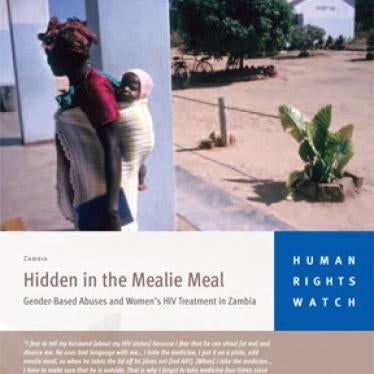(Lusaka, December 18, 2007) - The Zambian government is failing to address the life-threatening obstacles facing Zambian women living with HIV who experience domestic and gender-based violence, Human Rights Watch said in a report released today. Gender-based violence and insecure property rights are preventing Zambian women from accessing life-saving antiretroviral treatment.
While acknowledging the significant overall progress made by the Zambian government in scaling up HIV treatment generally, the 96-page report, "Hidden in the Mealie Meal: Gender-Based Abuses and Women's HIV Treatment in Zambia," documents how the government has fallen short of its international legal obligations to combat violence and discrimination against women. The report details abuses that obstruct women's ability to start and adhere to HIV treatment regimens, including violence against women and insecure property rights that often force women into poverty and dependent, abusive relationships.
"Addressing domestic violence, property grabbing, and unequal distribution of property upon divorce is critical to ensuring that women in Zambia have equal access to antiretroviral medicine" said Nada Ali, researcher in the Women's Rights Division of Human Rights Watch and author of the report. "Ignoring these abuses will mean that the Zambian government's goal of universal access to HIV treatment by 2010 will fail."
The report is based on interviews in Zambia's Lusaka and Copperbelt provinces with dozens of women living with HIV, HIV counselors and other healthcare providers, government officials, donors, and the police. The report documents how domestic violence and fear of violence thwarted women's ability to seek HIV information and testing, discouraged them from disclosing their HIV status to partners, delayed their pursuit of treatment, and caused them to miss clinic appointments and doses of medication.
"I fear to tell my husband [about my HIV status] because I fear that he can shout [at me] and divorce me," Maria T. (not her real name), 45, told Human Rights Watch. "I hide the medicine, I put it on a plate, add mealie meal, so when he takes the lid off he [does not find the medication]. [When] I take the medicine...I have to make sure that he is outside. That is why I forgot to take medicine four times since I started treatment [seven months ago]. Last year he hit me around the back with his fist."
The report documents how unequal distribution of property upon divorce and property grabbing by in-laws on the death of a spouse impede women's HIV treatment. Under the customary laws of many ethnic groups in Zambia, women have lesser property rights than men, and are often left with nothing when widowed or divorced. Fear of losing homes, land, and other property binds some women in abusive marriages. Women who lost property told Human Rights Watch that they struggled to pay for transport to clinics for HIV treatment and counseling and to afford the food they need for treatment to succeed.
In Zambia, 17 percent of the adult population is living with HIV/AIDS, 57 percent of whom are women. Girls and women between ages 14 and 25 are four times more likely to be infected with HIV than their male counterparts. More than half of ever-married women respondents to the 2001-2002 Zambia Demographic and Health Survey (ZDHS) reported having been beaten or abused by their husbands. In November 2006, the Zambia chapter of the Young Women's Christian Association reported that their shelter recorded 10 cases of rape of adult women in Lusaka every week. The ZDHS also found that a large majority of women (85 percent) and men (69 percent) believed that a husband is justified in beating his wife for at least one reason.
"Unless the Zambian government introduces legal and health system reform and removes the barriers to HIV treatment that women face, gender-based abuses will continue to shatter the lives of countless Zambian women in acute need of antiretroviral treatments and contribute to avoidable losses of health and lives," said Ali.
Despite the potentially deadly effect of gender-based abuses on women's HIV treatment, Zambia lacks specific legislation on violence against women. The only two shelters available for female survivors of gender-based violence are civil-society operated, and the Lusaka shelter is filled to capacity. Existing inheritance law is poorly enforced.
Zambia has made great strides in providing free antiretroviral medicine to more than half of those who need it. But the country's healthcare system is ill-equipped to respond to gender-based violence. Healthcare facilities providing HIV treatment have no systems to detect or respond to abuses such as domestic violence, and there are currently no government protocols on how to address violence in HIV treatment programs. HIV treatment counselors rarely ask about violence in the home, though many said they would do so with proper training and support.
"Healthcare facilities can play a key role in responding to violence and other abuses against women," said Ali. "Doing so not only helps women access and adhere to HIV treatment, it could also help end the abuse if it were part of a wider strategy to end violence and inequality between women and men. Unfortunately, this is not happening in Zambia."
Human Rights Watch called on the Zambian government to act urgently to enact and enforce legislation on sexual and gender-based violence and to ensure that the new constitution fully protects women's rights to equality.
The Zambian government should also establish systems to enable healthcare providers, including HIV treatment providers, to respond to gender-based abuses. At a minimum, the government should ensure that healthcare providers in the HIV sector receive adequate training, clear guidelines, and support to detect and respond to gender-based abuses. Donor agencies should support these reforms as a key component of effective treatment for women with HIV.







